Almost There: Robert Mitchum in "Heaven Knows, Mr. Allison" and "The Sundowners"
 Tuesday, November 16, 2021 at 1:15PM
Tuesday, November 16, 2021 at 1:15PM 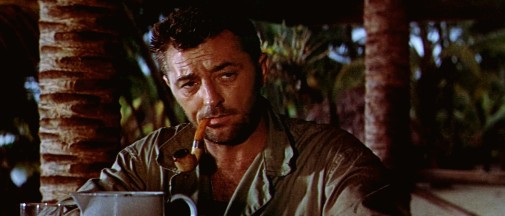
This month, the Criterion Channel has programmed a collection called "Robert Mitchum: Playing It Cool," dedicated to the star of classics like Out of the Past and The Night of the Hunter. This movie star wasn't always the easiest person to work with – he was even declared the Least Cooperative Actor by the Golden Apple Awards – but his talent was undeniable, as was his screen presence. That quality would make him an iconic face of postwar film noir and, consequently, a perfect fit for 'Noirvember'. However, we're not here to discuss that part of his filmography. Unfortunately, those flicks seldom got awards traction, and the Almost There series is about performances with Oscar buzz but no nomination.
Instead, the focus shall be on a couple of Deborah Kerr vehicles that costarred Mitchum and resulted in multiple Oscar nods. They were John Huston's Heaven Knows, Mr. Allison, and Fred Zinnemann's The Sundowners…
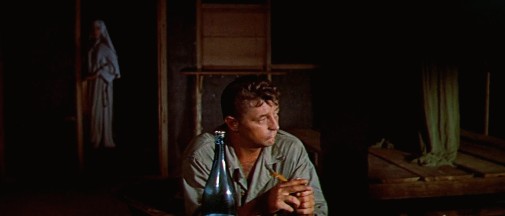
Heaven Knows Mr. Allison is set in 1944, on the back end of World War II, when an American marine escaping from Japanese troops finds shelter in a desert island somewhere on the Pacific. Only the territory isn't as denuded of human life as he might have thought. Novitiate Sister Angela is also there, and the two strike a friendship, fighting to keep hidden as enemy soldiers arrive on the island. It's a story of survival, of improvised warfare. It's also a necessarily unconsummated love affair, as Allison falls for the religious woman. While Angela rejects him, keeping faithful in her commitment to God, Kerr injects a powerful insinuation of reciprocated desire into her portrayal of the nun.
In some ways, it feels like a retread of The African Queen's central themes. Only it's less kinetic while featuring a pair with much more robust chemistry. Huston might have hated the Production Code's limitations and the Legion of Decency, but both Mitchum and Kerr find ways to suggest what couldn't be articulated. It's all in their heavy looks, the way they angle their bodies, how they negotiate the shared space in front of the camera. Deborah Kerr could have sexual chemistry with a plank of wood, but, even so, Mitchum matches her beat for beat, creating a dense cloud of sublimated lust that subsumes the movie and emanates from the screen.
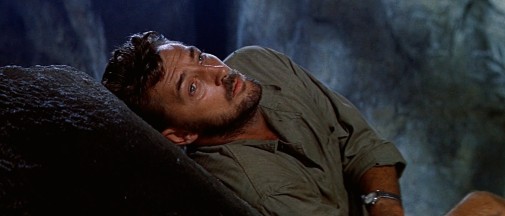
He plays the romance with taciturn respect, evoking the melancholy of someone who knows he'll probably never see his beloved once their misadventure is over and their lives continue in diverging paths. Mitchum conveys the depression and sorrow while never allowing that darkness to overwhelm the bond of friendship the film centers on as its plot unfolds. This dynamic works because, despite a projection of rough confidence, Mitchum also allows Allison to be bruising in his vulnerability. A drunken confession on a lonely night sends shockwaves of longing through the picture, quickly swallowed down with a tremor of shame flashing across the brute's face, riding through his body. On other occasions, he might let boyish enthusiasm shine through, becoming playful and full of merriment, eager to share his joy with Kerr's Sister Angela.
What could have been a simplistic story of clashing contrasts instead turns into a study of unsuspecting similarities. Both characters have an edge of regimental practicality, fully embodying their worlds, the military and the ecclesiastic. Furthermore, their sense of humor fits together. Their silences hang comfortably, denoting a common understanding that's far deeper than physical attraction. Mitchum, in particular, illuminates the tender feeling of recognition in Allison's regard for Angela. When struck by a late-coming epiphany, mayhap a divine revelation, the marine comes to empathize with the nun's selfless dedication to faith.
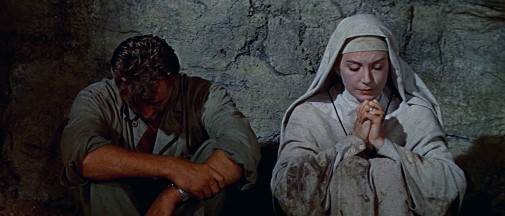
It sure sounds maudlin, but Mitchum was an actor that could deftly avoid such fates even when that meant he had to work against the script. Indeed, the antiauthoritarian quality to Mitchum's on and off-screen persona is a perfect fit for John Huston's cinema. The director's camera loves the actor's insolence, the rugged masculinity he exudes, and the glint of ironic glee in the corner of his eye. The hyper-macho fixations of the auteur coalesce around Mitchum, elevating him to an object of both desire and jealous admiration. It works because, while the film bends itself backward to frame him lovingly, the actor never strains to befit a model of desirability.
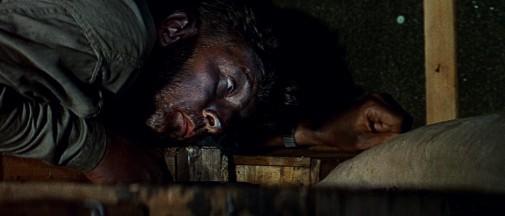
For the master of cool, the nonchalant naturalism of simply existing in front of the camera was enough. That's raw charisma, right there, and it extends to the scenes away from Kerr. Often, Mitchum's the critical element to making the thriller sequences enjoyable, constructing tension out of Allison's struggles to remain unnoticed in the shadows. For his part, cinematographer Oswald Morris lights the actor to great effect, getting the whites of his eyes to shine like beacons. A minimal expression of nervousness, the opening of his oft-half lidded peepers, is enough for Mitchum to make the scenes work, pumping adrenaline into the audience's bloodstream with a formidable economy of performance.
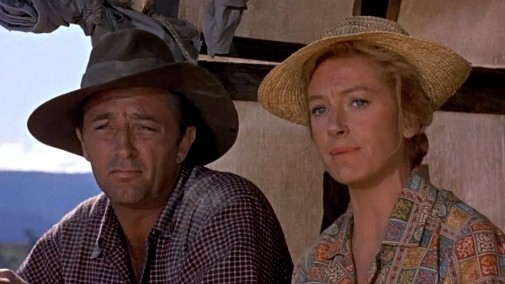
The Sundowners finds Kerr and Mitchum sharing the screen once more. Only this time around, their character's relationship is firmly consummated, with both actors playing up the unspoken carnality of the film's leading couple. Unfortunately, they're also Australian now, a less exciting detail than the fulfillment of sexual chemistry. That disappointment stems not from a bad script but from both thespian's clumsy attempts at specific accents, neither of which are convincing. Even so, Kerr fares better than her costar, whose inconsistent and undercooked speech choices can become distracting at times. That technicality aside, these are top-notch performances in an underrated flick. But, what is The Sundowners about, you might ask.
It's the travelogue-like chronicle of a poor Australian family in the 1920s, drifting through the countryside in pursuit of temporary work. Mostly, they get seasonal jobs with sheep, either herding the animals or shearing them for profit and competition. While lushly shot, it's more a tapestry of mundanity than an epic. There's not much plot to speak of, leaving the audience to drift alongside the Carmody clan. And yet, familiar tensions complicate the domestic peace, including the matriarch's growing disillusionment with their nomadic lifestyle. In that regard, she's the opposite of her husband, whose very sense of self feels tied to the unmoored aspect of the family's existence.
Ida and Paddy Carmody have a son, the young Sean, with his own opinions on their living situation. He yearns for the stability of a fixed home, the kind of luxury that remains unknown to him even as adulthood looms ever closer. The weariness of mother and son ends up moving the pater familias to reconsider his ways, though the process isn't easy for anyone. Mitchum illustrates the several forces pulling Paddy in opposing directions, showing us the love for family, for his people's honest wants, while also making us aware of how much it hurts to relent, to change. Both the picture and the actor respect Paddy's limitations, showing him sympathy without sentimentalizing him too much.
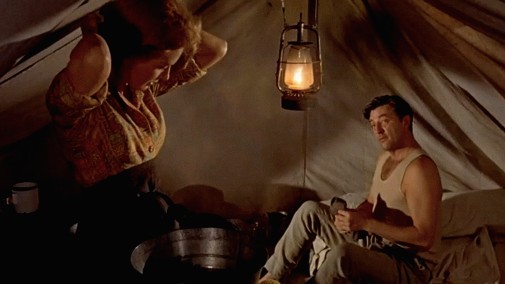
The most significant emotional impact comes when the patriarch accepts his own discontentment for the sake of wife and child. It's impactful because the man doesn't indulge in any rage against his condition. Instead, the most emotional reaction is delegated to the people who bequest his change, the sacrifice of his wanderlust tendencies. They are the ones who know him best and can deduce the inner turmoil Mitchum insists on keeping private. It's a very disciplined take on the character, constrained in such a way that concedes the spotlight to Kerr. She's the one who gets to open our eyes to the light dimming inside Paddy whenever the Carmody clan stops moving through the country. Stagnation is slowly killing him, but he'll still pretend to be strong.
A cocky posture here, a gruff smirk there, help telegraph the gentle duplicity. However, unlike Mitchum, Paddy's no perfect performer. His act has holes in it, and he can vacillate in self-sabotaging ways. Paddy's no saint either. Nobody involved in The Sundowners seems keen on reducing any part to such flat idealizations. Sometimes, the only reason the leading guy's likable is that Robert Mitchum is playing him. Moreover, his scenes alone with Kerr express the formidable craft of faking deep-rooted intimacy rather than a more fleeting ardor. Paddy and Ida feel like people who've long ago gotten to know each other, bodies and all, and whose mutual appreciation hasn't run out despite numerous disappointments.
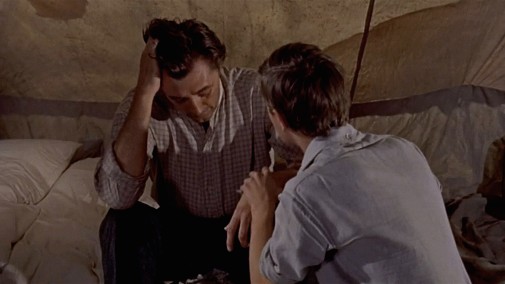
We can imagine a bond forged over the years by admiring how they relate to one another in closed spaces, how they play casual sensuality in public with a comfortable languidness that speaks of decades shared. There's also a keen looseness to how the pair inhabits the screen, a sort of calculated shamelessness that reads earthy rather than lurid. Moreover, both actors create a palpable sense of sun-beaten weariness, people shaped by hard work. Their hands calloused, skin tanned, muscles tired, and spirits resilient, the Carmodys are a vision of working-class decency that's grounded in realism rather than the ennobling clichés one might expect from such an Old Hollywood artifact.
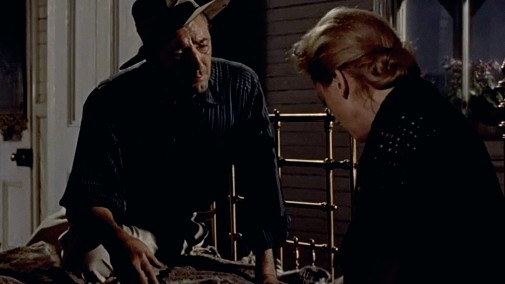
In 1957, some people predicted that Heaven Knows, Mr. Allison would be the film to finally win Deborah Kerr the Academy Award. One would think such positive Oscar buzz could have extended to her leading man, especially considering AMPAS also nominated the screenplay. Still, despite a BAFTA nomination, Robert Mitchum failed to make the Oscar five. Instead, the Academy chose Marlon Brando in Sayonara, Anthony Franciosa in A Hatful of Rain, Alec Guinness in The Bridge on the River Kwai, Charles Laughton in Witness in the Prosecution, and Anthony Quinn in Wild Is the Wind. Guinness won for that year's Best Picture champion.
Regarding the 1960 Oscar race, Kerr was again nominated while her leading man was ignored. However, the situation was more flagrant since The Sundowners was a hit with the Academy, nabbing additional nominations for Picture, Director, Supporting Actress, and Adapted Screenplay. Mitchum won the NBR for Best Actor but failed to secure enough votes within the Academy. Instead, AMPAS chose to nominate Trevor Howard in Sons and Lovers, Burt Lancaster in Elmer Gantry, Jack Lemmon in The Apartment, Laurence Olivier in The Entertainer, and Spencer Tracy in Inherit the Wind. Lancaster won.
As for Mitchum, he wasn't nominated in the following years either, despite working until the mid-90s. His one and only nomination was for his star-making role in 1945's Story of G.I. Joe. He lost that Best Supporting Actor Oscar to James Dunn in A Tree Grows in Brooklyn.
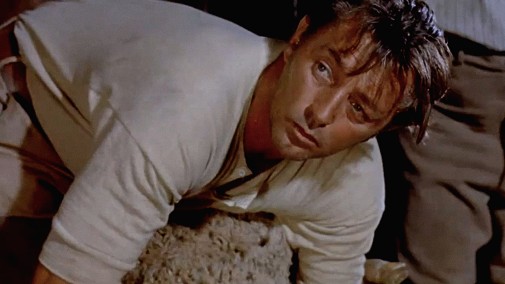
Both Heaven Knows, Mr. Allison, and The Sundowners are streaming in The Criterion Channel, along with many other great Robert Mitchum movies. You can also watch the two pictures by renting them on a myriad of platforms.



Reader Comments (3)
After reading this I am curious about your thoughts on Mitchum's performance in Ryan's Daughter- a film in which he somehow seems miscast and perfectly cast for.
@TomG-I liked him in that film as he was one of the few things in the film that worked along with the visuals. Other than that, it's my least favorite film by David Lean.
Great write-up. I love both of these films. The Mitchum/Kerr chemistry is amaze-balls, but as Claudio points out, Kerr has chemistry with the air. I wanted her to dump Cary Grant for Bob in the lesser film, The Grass is Greener.
This made me laugh:
"That disappointment stems not from a bad script but from both thespian's clumsy attempts at specific accents, neither of which are convincing."
Because, honestly, THE SUNDOWNERS is a much better Australian movie than AUSTRALIA, lead by two actual AUSTRALIANS!